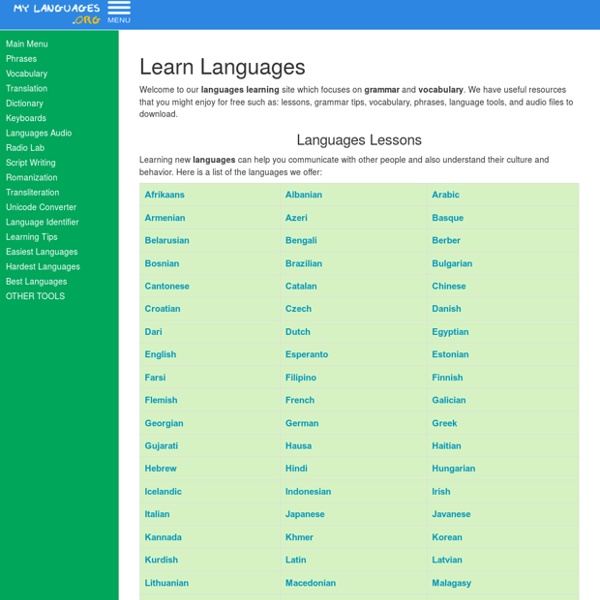



English Tests - Welcome Korean/Lesson I1 Korean Conversation, Level I, Lesson 1: Greetings[edit] Welcome to the first conversation lesson for learning Korean. By now you should be familiar with hangeul (the Korean writing system) and how to form syllables. If you are not yet familiar with hangeul, see Korean/Alphabet. In this first section, we will introduce basic Korean sentence structure, basic vocabulary, and greetings in Korean. 시작할까요? (Shall we start?) Dialogue[edit] The simple dialogue below is between Korean native 찬호 and Joseph (조세프) from America. 찬호: 안녕하십니까, 조세프 씨? 조세프: 예. 찬호: 만나서 반갑습니다. 조세프: 저도요. 찬호: 예. 조세프: 안녕히 계십시오. Overview[edit] The conversation began with 찬호 asking this: 찬호: 안녕하십니까, 조세프 씨? Here, we learn our first bit of Korean. 조세프: 예. "예" means "yes". 찬호: 만나서 반갑습니다. "만나서 반갑습니다" means "Nice to meet you." 조세프: 저도요. Here, we learn some important things about making a Korean sentence. 찬호: 예. 조세프: 안녕히 계십시오. Look carefully at how each says "Good bye" to each other. Grammar: "I go home." Let's discuss 는, 에, and 갑니다. Review[edit]
Interlinear Books - Bringing Literature to Language Learning Handouts Online: EFL / ESL Worksheets, activities and lesson plans KoreanClass101.com Blog paralleltext A to Z Teacher Stuff Themes | Common Expressions Translated Into Korean - Tipskey In my interpretation, a common or fixed expression in a language is a phrase, clause or short sentence that is frequently used and has minimal or no change of word. Of course "do not make it spicy" is not a common expression but you are going to need that sentence in Korea if you cannot take spicy food. Here I just focus on phrases that cannot be easily simulated by nonverbal communication (facial expression, hand signal etc) and by universally known phrases like "OK". And I avoid some dumb questions too like "Do you speak English". In Korean an expression can be conveyed in several different sentences. I will just use the common and formal ones here. The pronunciation here is not written according to standard Korean textbook because I think people will not pronounce Korean correctly with the existing method. Anyway if you do not want to pronounce it, you can show them the Korean sentence from this list.
Learning English with Michelle Engelska | Framtidskompassen Tyvärr finns inte det digitala materialet till "Whats's up" längre tillgängligt i fri form. Spotlight - digitalt material till 6:ornas läromedel Allmänt:BBC:s "Bytesize" - massor av övningar, förklaringar, animeringar och spelCrosswordlab - skapa korsord som går att lösa onlineABCya.com - blandade övningar på engelska, bra i flera olika ämnenDigipuzzle - Blandade språkövningar på engelska. Träna glosor:Quizlet (skapa konto är gratis. Grammatik: Ordklasser: Word Invasion - bläckfisk fångar ord från olika ordklasser Ordklasser: GrammarNinja - kasta kaststjärnor på rätt ordklasser Ordklasser: Find the Adjectives - leta adjektiv i meningar Ordklasser: Starship - träna verb i presens (nutid) och imperfekt (dåtid) Vokaler: Coconut VowelsHarcourt: Olika grammatiska spel och övningarWebbmagistern - främst oregelbundna verb. Hör- och läsövningar:Why Anasi has thin legsThe Great RaceThe Greedy HippoAngel! National Geographic - Massor av artiklar med både ljud och text.
To Foreigners in Korea: Please learn a little Korean From here: A video is circulating on the Korean Internet of a black gentleman yelling at and threatening an elderly Korean couple. His violent behavior was the result of him misunderstanding the elderly man’s comment to him. The elderly man reportedly said “니가 여기 앉아” (a sign of consideration) but not knowing Korean, the man in question interpreted “니가” as the N-word which led to his violent outburst. *The video in question is at the bottom of this article. Apparently our culprit learned “개새끼야” but couldn’t be bothered to learn simple pronouns. 부모님은 참 자랑스러워 하시겠다. UPDATE (by Robert Koehler): The IBT speculates as to the initial cause of the brouhaha. I have no idea if that’s true, but the scenario is plausible enough, and serves as an opportunity for the second piece of unsolicited advice we at the Marmot’s Hole will proffer today — in addition to learning a bit of Korean, please, for the love of Christ, keep your voices down when speaking English on buses and subways.
Free language learning for the aspiring polyglot. Learn English free with USA Learns! Learn English, anytime day or night. A site for adults to improve English speaking, pronunciation, listening, reading, spelling, writing and grammar. Start Now <a href="signup.cfm" id="bttnStartNow"><span>Start Now</span></a> The perfect way to learn English online! USA Learns is a great way to learn English online by watching interesting videos and completing educational activities. 215 Hours of Free Foreign Language Lessons on Spotify: French, Chinese, German, Russian & More In September, we highlighted for you 75 free audio books available on Spotify–books written by the likes of Jane Austen, James Joyce, Charles Bukowski, Franz Kafka, Kurt Vonnegut, Edgar Allan Poe, Jack Kerouac, Sylvia Plath, William Shakespeare & more. Peruse the complete list here. This month, we’re here to tell you that Spotify makes free language lessons available on its service. If you go to Spotify (download its software here), click “Browse” (in the left hand nav), then scroll way down and click “Word,” you will find collections of free languages in the following languages. You can also click the links below to access 215 hours of free language lessons: Arabic (12 hours of audio lessons)Chinese (27 hours)French (45 hours)German (42 hours)Irish (4 hours)Italian (53 hours)Portuguese (8 hours)Russian (18 hours)Swedish (6 hours) You can find many more lessons, covering many more languages, in our collection: Learn 48 Languages Online for Free: Spanish, Chinese, English & More.